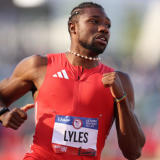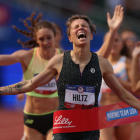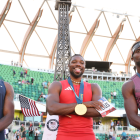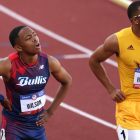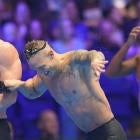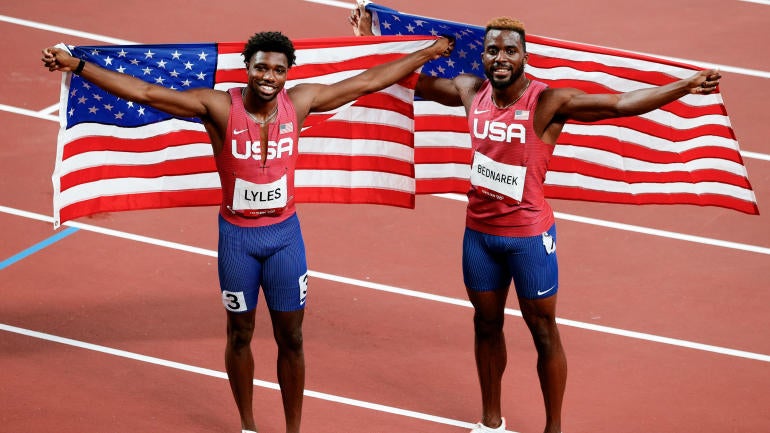
Remember this charming moment from the Rio Olympics in 2016?
That was Usain Bolt's final go at the Games. He'd crested past his peak by that point, but the iconic 6-foot-5 Jamaican sprinter was still the greatest in the world. For an unprecedented third consecutive Olympics, Bolt won gold in the 100- and 200-meter dashes. It was the semifinal heat of the 200 that produced the cheeky moment above.
Who's the other guy? Only one of the greatest sprinters in history, Canadian Andre De Grasse. But then again, when you're running next to Bolt, you're forever shrouded by his shadow.
As of Wednesday, De Grasse, 26, is overlooked no more.
He emerged into the spotlight in Tokyo and blazed to a Canadian-record 200 time of 19.62 to win the men's final in upset fashion. No, it would not be reigning world champion, American Noah Lyles, who crossed first. And it wouldn't be 17-year-old phenom Erriyon Knighton, from Tampa, either.
De Grasse's sprint was good for No. 8 all time in the event. He sprinted .06 of a second ahead of American Kenny Bednarek, who won silver with a personal-best of 19.68. Lyles, running from a slightly disadvantageous Lane 3, crossed in 19.74 to take bronze.
Knighton, who was easily coasting past competitors in his opening two heats, somewhat surprisingly did not find the podium. His 19.93 run placed him fourth. Chalk it up to inexperience. Knighton's been running competitively for less than three years. He'll have superstar potential by the time we get to the Paris Games in 2024.
For Lyles, it's a medal, sure, but it's also undeniably a letdown. He may have inadvertently done himself in when, on Tuesday, he eased up far too much in the final 15 meters of the 200 semi. Upon doing so, Lyles was caught just barely by Canada's Aaron Brown and Liberia's Joseph Fahnbulleh.
It was a needless mistake.
Because he was third in that semifinal by a thousandth of a second, Lyles' position for Wednesday's final nudged him from his preferred position: Lane 4. As a result, Lyles pushed harder on the turn than normal. In a few seconds' time, it was clear he couldn't close with his typical finishing speed -- his signature attribute in the 200.
With De Grasse running the best race of his life, it meant the favored United States triad of Bednarek, Lyles and Knighton would finish 2-3-4.
#TeamUSATF goes 🥈 & 🥉 in the Men’s 200m final!pic.twitter.com/KFY2ldts4T
— USATF (@usatf) August 4, 2021
De Grasse's win gives him two medals at these Games; he also took bronze earlier in the week in the 100-meter dash. A big moment for Canada, which usually saves its biggest Olympic showings in the winter. He's now one of just seven men in history to win at least two Olympics medals in the 200, and is one of only three people ever to win at least four Olympics medals combined in the 100 and 200, with at least one of those medals gold.
The other two are Bolt and Carl Lewis. Phenomenal company.
And while we continue to champion winning silver and bronze medals, it can also be true that not winning a gold can reflect disappointment and underperformance. That's exactly what happened to the United States on Wednesday. In B.B (Before Bolt) times, the 100 and 200 were events American men effectively dominated. From 1984-2004, the U.S. men won nine out of the available 12 golds in the 100 and 200.
Now, Team USA's drought on golds on the men's side in the 100 and 200 will extend to an unthinkable 20 years by the time we get to Paris in 2024.
Most of that is because of Bolt, of course, who took the top spots in 2008, 2012 and 2016. Wednesday's race was a plot twist, though. This was Lyles' to lose, and lose he did. Bednarek ran brilliantly; to finish with a silver and a personal-best is a great feat.
It's Knighton who's the most interesting. At 17, he is the youngest American male to qualify for the Summer Games since 1964. He was projected to earn a medal due to his freakishly good running earlier this year. After all, this is a young man who now holds the world records in the 200 in the under-18 and under-20 categories. Those records were previously held by Bolt.
Nothing matches the pressure and intensity of a race final on an Olympic stage, though. For Knighton to take fourth was both a great run and a surprise, because his potential is so tantalizing. Let's keep in mind: he has not graduated high school yet. Still, it's a bit ironic that at these Tokyo Games, where the United States is again throttling the competition in track and field (as of this publishing, it has 16 medals; Poland is second with six), the American men failed to take first in the 100 and 200.
Knighton is 17, Bednarek is 22, Lyles is 24. The pandemic has created a situation where the next Olympics are a three-year wait instead of four. The future is absolutely bright, and a 2-3-4 finish is an encouraging showing. Paris should be the stage where the United States speeds back to the top of the podium in the most prestigious events in track.



